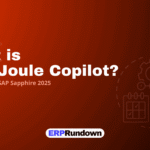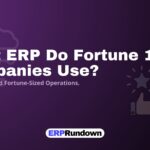AI is no longer a buzzword—it’s a cornerstone of innovation across industries, and the ERP industry is no different. Traditionally, ERPs served as centralized platforms to manage resources, track operations, and streamline workflows. However, the integration of AI in ERP has shifted these systems from passive data trackers to active decision-makers.
AI-powered ERPs bring unparalleled efficiency by automating repetitive tasks, uncovering insights from complex datasets, and predicting trends that help businesses adapt in real time. From improving financial management to refining supply chain operations, AI transforms every aspect of ERP systems.
This blog explores the current and future impact on AI in ERP – with practical examples, top AI-First ERP software, and actionable insights for businesses at any stage of their ERP journey.
The Numbers: AI’s Growing Impact on ERP Systems
- According to IDC Technology Spotlight, nearly 65% of organizations believe AI is a must-have component in ERP moving forward.
- businesses integrating AI into their ERP systems can expect to see a 30% reduction in manual errors and a 20% increase in operational efficiency, a PWC report.
- AI adoption in ERP is particularly strong in manufacturing, with around 93% companies having confidence in AI as a growth catalyst, says a Deloitte survey.
Impact of AI in ERP Systems
1. Smarter Financial Management
AI enhances financial operations by automating processes like reconciling transactions, auditing accounts, and detecting fraud. For example, SAP S/4HANA Finance uses machine learning algorithms to predict cash flow and optimize spending. A case in point is Deloitte, which implemented SAP’s AI tools to reduce manual financial errors by 40%, improving compliance and accuracy.2. Real-Time Decision-Making
AI-driven ERPs process data faster than ever, enabling businesses to make informed decisions in real time. For instance, Oracle ERP Cloud employs predictive analytics to forecast supply chain disruptions, reducing downtime by 20% for companies like FedEx, which relies on Oracle to maintain smooth logistics operations.3. Inventory Optimization
Managing inventory is a balancing act—too much leads to high carrying costs, while too little results in lost sales. AI in NetSuite ERP analyzes sales trends and automates restocking, saving companies an average of 15% on inventory costs annually. Shein, a fast-fashion retailer, credits NetSuite’s AI capabilities for its ability to meet fluctuating demand without overstocking.4. Fraud Detection in Finance
AI in ERP systems identifies unusual transactions and suspicious activities instantly. Microsoft Dynamics 365 uses anomaly detection to flag fraudulent patterns, helping companies like JPMorgan save millions annually in fraud prevention costs.5. Supply Chain Precision
AI makes supply chains more resilient by predicting delays and offering alternate routes or suppliers. Epicor ERP, paired with IoT devices, enables manufacturers to reduce lead times by 25%. For example, a mid-sized automotive firm in Germany saw production interruptions drop by 30% using Epicor’s AI-based monitoring.6. Workforce Automation
AI automates routine HR tasks, from screening resumes to tracking employee performance. Acumatica ERP leverages AI to recommend top candidates based on skill matching—cutting recruitment time by 50% for companies like Indeed.7. Predictive Maintenance for Equipment
By analyzing IoT sensor data, AI in ERP systems predicts machinery failures before they occur. SAP Predictive Maintenance saved an energy company in Brazil $2 million annually by reducing unplanned downtime.8. Personalized Dashboards
AI generates user-specific dashboards based on roles, ensuring that employees see only the data they need. Acumatica ERP improved team productivity for a global retail brand by 15% using tailored KPIs.9. Enhanced Customer Service
AI-powered chatbots integrated with ERP systems handle routine queries, freeing up human resources for complex tasks. Oracle ERP Cloud enabled an e-commerce firm to resolve 90% of customer inquiries through AI-driven assistants.10. Regulatory Compliance
AI tracks regulatory changes and automates reporting, ensuring businesses remain compliant. Epicor ERP helped a U.S.-based healthcare company save over $500,000 annually in compliance-related penalties.Top AI-First ERP Vendors to Watch in 2025
1. SAP
SAP is a global leader in ERP solutions, known for its robust S/4HANA platform that integrates advanced machine learning and predictive analytics. With a strong foothold in industries like manufacturing, retail, and logistics, SAP helps businesses streamline operations and derive actionable insights from vast datasets. SAP’s AI Vision for 2025 SAP is focusing on embedding conversational AI and advanced predictive algorithms into its ERP offerings. According to SAP’s official roadmap, they plan to introduce AI-driven process mining tools that will automate bottleneck detection in workflows and integrate AI models capable of providing prescriptive suggestions for complex decision-making. Additionally, their investment in AI ethics aims to make ERP systems safer and more transparent. Impact on Businesses Businesses can expect faster process optimization and smarter supply chain management. For instance, a manufacturing company using SAP’s AI-driven predictive maintenance tools could reduce downtime by 30%, minimizing production delays and saving millions in operational costs.2. Microsoft Dynamics 365
Microsoft Dynamics 365 is celebrated for its seamless integration with the Microsoft ecosystem, offering a blend of ERP and CRM capabilities. Its AI features focus on predictive maintenance, anomaly detection, and intelligent financial forecasting. Microsoft’s AI Vision for 2025 Microsoft plans to amplify Dynamics 365 with generative AI tools—powered by OpenAI models—to enhance reporting, automate data analysis, and deliver AI-driven workforce collaboration solutions. Their roadmap also includes industry-specific AI models, particularly for retail and healthcare businesses to get tailored insights for faster decision-making. Impact on Businesses With Microsoft’s generative AI capabilities, businesses can streamline workflows and unlock creative solutions. For example, a retail chain could use AI-powered demand forecasting to optimize inventory across hundreds of stores—reducing overstock by 25% and cutting waste.3. Oracle ERP Cloud
Oracle ERP Cloud stands out for its advanced analytics and AI-powered chatbots. With a focus on end-to-end business operations, Oracle has established itself as a go-to ERP solution for enterprises aiming to automate and innovate. Oracle’s AI Vision for 2025 Oracle plans to integrate AI-based financial compliance tools to detect fraud and anomalies faster while enhancing their AI-enabled smart chatbots for seamless customer interactions. They’re also working on autonomous ERP systems that self-optimize processes based on real-time data analysis. Impact on Businesses Oracle’s AI-first ERPs will revolutionize customer service and financial transparency. For instance, a telecom company could save $10 million annually by automating fraud detection and improving billing accuracy with AI.4. Acumatica
Acumatica delivers ERP solutions tailored for small and mid-sized enterprises, offering AI-driven dashboards and role-based insights to boost productivity. Acumatica’s AI Vision for 2025 Acumatica plans to focus on AI-powered user experiences, enabling voice-activated commands and automated reporting. They’re also doubling down on AI-driven sustainability solutions, helping businesses track and reduce their carbon footprints. Impact on Businesses With Acumatica’s AI advancements, companies can enhance user engagement while aligning with sustainability goals. For example, a logistics company could lower its energy consumption by 15%, thanks to real-time insights from Acumatica’s AI models.5. Epicor
Epicor specializes in manufacturing and distribution ERP solutions, leveraging AI and IoT for predictive maintenance and inventory optimization. Epicor’s AI Vision for 2025 Epicor is focusing on AI-powered quality control systems for manufacturers, using machine learning algorithms to detect defects early. They’re also integrating AI-driven workforce management tools to improve employee productivity and reduce downtime. Impact on Businesses Epicor’s focus on predictive tools could save manufacturers millions. A case study predicts a U.S. automotive supplier could reduce defective products by 25%, cutting warranty costs significantly.6. NetSuite
A pioneer in cloud ERP, NetSuite is designed for fast-growing businesses. Known for its AI-driven demand forecasting, it helps enterprises predict inventory needs and manage resources with precision. NetSuite’s AI Vision for 2025 NetSuite aims to launch predictive supply chain optimization tools that will leverage real-time market data to recommend optimal sourcing strategies. They’re also enhancing their AI-driven project management tools to deliver intelligent task prioritization and resource allocation. Impact on Businesses NetSuite’s enhancements could empower businesses to meet fluctuating demands effectively. A mid-sized e-commerce brand, for instance, could increase its fulfillment efficiency by 40% during peak seasons, thanks to smarter inventory predictions.7. Workday
Workday excels in human capital management (HCM) and ERP solutions, offering AI-driven automation for recruitment, payroll, and performance tracking. Workday’s AI Vision for 2025 Workday is investing in AI-powered talent matching and skill-building platforms that help businesses upskill employees rapidly. They’re also enhancing their AI-driven workforce planning tools to predict future hiring needs. Impact on Businesses: With Workday’s innovations, businesses can reduce recruitment timelines by 50% and ensure workforce readiness for future challenges.The Future of AI in ERP: Predictions for 2025
AI’s role in ERP systems is on the cusp of transforming business operations. As AI technologies become more refined, ERP systems are moving beyond traditional automation and data analysis to embrace predictive analytics, cognitive decision-making, and self-optimizing workflows. The next few years will bring exponential growth in AI-powered ERP systems. The most notable future trends in ERP will center around personalized decision-making, autonomous ERP systems, and AI-powered supply chains, just to name a few. 1. AI-Driven Predictive Analytics & Forecasting AI’s ability to make accurate predictions based on historical data and patterns is a game changer for ERP systems. In the coming years, ERP platforms will utilize AI not just to analyze historical data, but to forecast future trends with greater precision. Businesses will no longer need to rely solely on manual inputs or static reports. AI will enable predictive capabilities that assess market conditions, optimize production schedules, and predict future demand or customer behavior. ERP systems will evolve to make smarter, more reliable forecasts, guiding companies in making proactive, data-backed decisions. Impact: AI will revolutionize demand forecasting across industries. For example, an AI-enhanced ERP system might predict supply shortages months in advance, allowing companies to adjust production schedules proactively. This shift could lead to major cost savings and improved customer satisfaction. 2. Autonomous ERP Systems The future of ERP systems includes a shift toward autonomy. Autonomous ERP systems will use AI to self-optimize, self-configure, and even self-correct. Instead of manual input, these systems will continually adjust workflows, reports, and decision-making models to optimize performance. Automation will evolve into deep learning systems that will adjust business strategies based on environmental or market conditions. These self-aware systems will be able to detect inefficiencies and suggest solutions, automating not only tasks but also critical strategic decisions. Impact: Autonomous ERPs will save companies significant time and resources by automatically managing processes like invoicing, inventory control, and budgeting. For instance, a system might automatically flag discrepancies in financial records, initiate corrective actions, and learn from the data over time to prevent recurrence. 3. AI-Powered Supply Chain Optimization Supply chain management has long been an area ripe for innovation. AI’s ability to evaluate massive datasets in real time, combined with its predictive analytics, will dramatically improve how ERP systems manage supply chains. AI-powered systems will have the ability to predict disruptions, reroute deliveries in real-time, and automate the ordering of raw materials based on predictive demand. Impact: Supply chain efficiency will improve dramatically as AI anticipates and mitigates potential disruptions before they occur. For example, AI could predict a potential strike at a key supplier’s location, allowing the system to automatically source alternate suppliers and prevent inventory shortages. 4. Hyper-Personalized Customer Experiences Customer relationship management (CRM) integrated with AI will see a major overhaul. ERP systems, alongside AI, will enable hyper-personalized experiences for customers. Businesses will be able to use predictive models to anticipate customer needs, adjust communications in real-time, and tailor products to individual preferences. The combination of AI with CRM within ERP will allow companies to craft custom, data-driven experiences that deeply resonate with each customer segment. Impact: This will allow businesses to make decisions based on dynamic customer data, improving engagement and satisfaction. For example, an AI system might analyze customer purchase history and suggest products in real-time, boosting conversion rates and customer loyalty. 5. Intelligent Financial Management AI-powered ERP systems will elevate financial management processes. Intelligent financial analytics powered by AI will provide businesses with real-time insights into cash flow, credit risks, and profit margins. Rather than relying on static, periodic reports, AI will help businesses identify financial trends early, making strategic decisions faster and more effectively. Real-time, AI-powered financial modeling will forecast financial outcomes based on external factors, offering businesses the ability to pivot on a dime. Impact: This will transform finance teams from reactive to proactive. For example, businesses will be able to anticipate cash flow shortages and secure financing well in advance, rather than being caught off guard. AI-driven financial analytics will enable businesses to respond quickly to market conditions and adjust budgets accordingly. 6. AI-Powered Employee Engagement & HR Systems HR departments are another area where AI-powered ERP systems will have a transformative impact. AI will streamline recruitment processes by automatically screening resumes, identifying candidate potential, and predicting how well they will fit into specific roles. Employee performance and engagement will also be tracked in real time, allowing HR teams to offer personalized development opportunities. AI can identify patterns in employee turnover, helping HR teams to intervene early and improve retention. Impact: AI will change how companies approach human resource management, making it more data-driven and personalized. The system can proactively identify the need for training, engagement initiatives, or even salary adjustments to maintain employee morale and productivity.Wrap Up…
The fusion of AI with ERP is rewriting the rules of business efficiency. Whether you’re a startup exploring ERP solutions or a global enterprise optimizing processes, investing in AI-first ERP systems and preparing yourself to embrace the paradigm shift is the way forward to scalable and sustainable growth.FAQs
1. Which industries benefit the most from AI in ERP?
AI in ERP is revolutionizing industries like manufacturing, retail, healthcare, and logistics. An AI-powered manufacturing ERP can help optimize production schedules and predictive maintenance. Retailers use AI for inventory management, reducing costs and stockouts. In healthcare, AI-driven ERPs streamline compliance and enhance patient care. Logistics companies leverage AI for predictive supply chain management and real-time tracking.2. How do AI-driven ERPs improve decision-making?
AI-powered ERPs process massive amounts of data in real-time, offering predictive insights that empower businesses to make data-backed decisions swiftly. With tools like predictive analytics and machine learning models, AI can spot trends, forecast demand, and identify potential risks, all of which help businesses act proactively rather than reactively.3. Are AI-powered ERPs cost-effective for businesses?
Yes, AI-powered ERPs deliver substantial cost savings by automating processes, reducing human error, and improving operational efficiency. Businesses experience reductions in manual work, increased accuracy in forecasting, and lower operational costs. For example, companies using AI-driven financial modules often see a 30% reduction in administrative costs.4. Which ERP systems lead the pack in AI integration?
SAP S/4HANA, Oracle ERP Cloud, and Microsoft Dynamics 365 are the frontrunners in AI integration. SAP excels with predictive analytics in financial management, while Oracle leads with AI-driven customer engagement and supply chain forecasting. Microsoft Dynamics 365 offers powerful machine learning and fraud detection capabilities, making it a top choice for enterprises seeking AI-first solutions.5. How does AI enhance regulatory compliance in ERP systems?
AI in ERP systems automates regulatory monitoring, instantly tracking changes in laws and standards. It flags non-compliance risks, generates compliance reports, and ensures businesses meet industry-specific regulations. This level of automation not only reduces penalties but also saves time that would otherwise be spent manually managing compliance tasks.6. Can AI-driven ERPs be suitable for small businesses?
Absolutely. Many ERP providers, such as Acumatica and NetSuite, offer AI-driven solutions tailored to small and mid-sized businesses. These systems scale as the business grows, helping them manage finances, inventory, and HR more efficiently. AI-driven insights allow small businesses to compete with larger players, optimizing their processes and improving decision-making without the need for extensive IT resources.7. What are the top future trends for AI in ERP?
The future of AI in ERP includes advancements in predictive analytics, hyper-automation, and IoT integration. We’re also seeing the rise of self-optimizing systems that learn and adapt workflows based on historical data. Furthermore, industry-specific AI models are emerging to offer tailored solutions for sectors like manufacturing, healthcare, and retail, enabling businesses to gain more granular insights and optimize their operations.8. How do I choose the right AI-powered ERP system?
Selecting the right AI-driven ERP depends on factors like industry requirements, specific AI capabilities, and scalability. Assess the ERP vendor’s track record with AI features such as predictive analytics, automation, and data integration. Businesses should also consider ease of use, integration capabilities with existing tools, and long-term support. Consulting ERP experts within your industry can help you with successful implementation and change management.Kamran Arshad is the Co-founder of ERP Rundown - an unbiased platform for the latest ERP news, insights, analysis, and resources to help ERP buyers make informed decision.







Leave a Reply